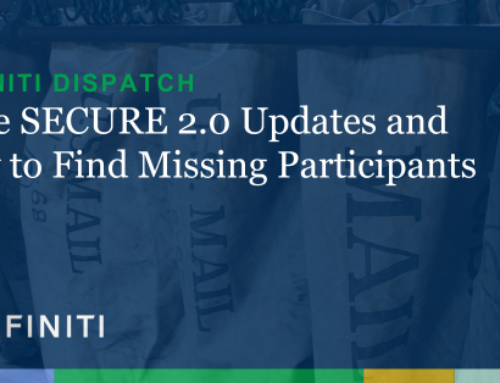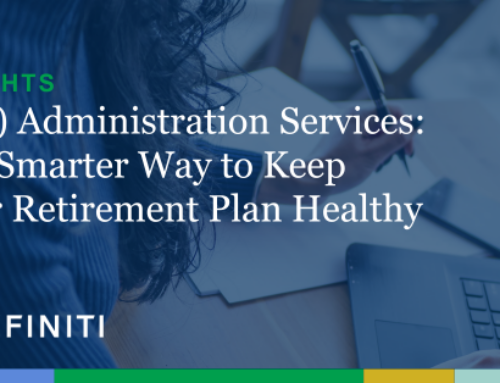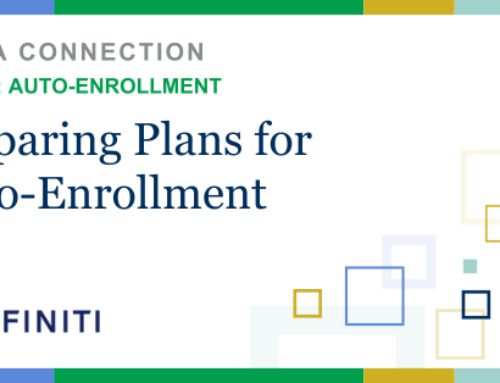VOL 3: CARES Act
The CARES Act, signed into law on March 27, 2020, contained many employee benefits provisions that provided relief to retirement plans and their participants. The IRS later issued guidance to clarify some of the Act’s requirements. The following is a discussion of two key provisions: Required Minimum Distribution waivers and safe harbor mid-year suspension of contributions, both with deadlines of August 31, 2020.
Notice 2020-51:
Waiver of Required Minimum Distributions
Defined contribution (DC) plans such as 401(k)s are generally required to begin paying out distributions to participants (known as Required Minimum Distributions or RMDs) beginning on the April 1st of the year following the year in which the participant reaches age 72. Once participants take their initial RMD, they must take an RMD every year by April 15th.
The CARES Act waived the requirement for 2020 RMDs (and also for those 2019 RMDs due to start on April 1, 2020) to provide a measure of relief. Unfortunately, many participants had already taken their RMDs for the year and were unable to take advantage of the waiver.
What to do?
First the IRS extended the usual 60-day rollover period to July 15th for participants to put their RMD back into their retirement plan or IRA and thus avoid taxation on it. But that still didn’t catch everyone who wanted to redeposit their RMDs.
- Additional guidance issued July 1, 2020, Notice 2020-51, resolved some of the confusion by:
- Extending the rollover deadline to August 31, 2020, even if the RMD was taken in January 2020;
- Treating 2020 RMDs as voluntary distributions instead of RMDs (voluntary distributions are eligible for rollovers and RMDs are usually not);
- Waiving the 2020 RMD for participants whose beginning date is April 15, 2021; and
- Including a sample plan amendment plan sponsors can use to amend their plan for the waivers (if they choose to allow them).
This is good news for those participants who took an RMD earlier in 2020 and now want to put it back.
Notice 2020-52: Suspension of
401(k) Safe Harbor Contributions
Retirement plans must generally pass strict tests to show they don’t discriminate in favor of highly compensated employees by providing a disproportionate level of plan benefits to them.
A 401(k) safe harbor plan is a defined contribution plan that is exempt from these nondiscrimination tests because it is designed so all employees can benefit from the plan. But the exemption comes at a price: the company is required to contribute to their employees’ 401(k) accounts and provide 100% vesting.
Plan sponsors can make contributions to a safe harbor 401(k) in one of three ways:
- Basic matching. Employer matches 100% of employee contributions up to 3% of compensation, plus 50% on the next 2% of compensation.
- Employer matching. Employer matches 100% of employee contributions on the first 4% of compensation.
- Nonelective contribution. Employer contributes 3% of compensation to all employees regardless of whether they contribute to the plan.
Yet the requirement to make ongoing contributions to the plan presents difficulties in these days of tight budgets and diminished cash flow. It’s only natural for employers to look at reducing or suspending their safe harbor contributions as a way to reduce costs.
The problem? Safe harbor contributions must generally be made all year long. Plan sponsors are permitted to suspend contribution mid-year only if:
- The company is operating at an economic loss, or
- The annual employee notice indicates that contributions could be reduced or suspended mid-year, and
- The company meets additional requirements.
Notice 2020-52, released June 29, 2020, addresses the relaxed notice requirements. If these notice requirements are satisfied, the plan sponsor can reduce or suspend matching or nonelective contributions in mid-year even if the employer isn’t able to meet the economic loss or notice conditions above by doing one or more of the following:
- Amend the plan between March 13, 2020, and August 31, 2020, and
- Provide a notice to participants about the reduction or suspension of matching contributions 30 days before the change allowing them to adjust their contributions, or
- Provide a notice to participants about the reduction or suspension of nonelective contributions allowing them to adjust their contributions no later than August 31, 2020 (the 30-day notice is not required).
The downside: plans that take advantage of these provisions will lose their safe harbor status and be subject to nondiscrimination testing for the entire 2020 plan year.



